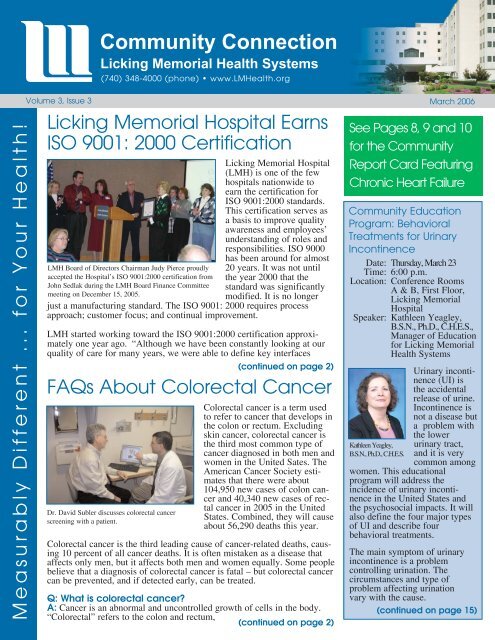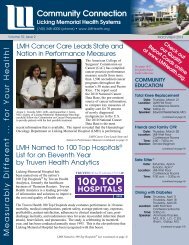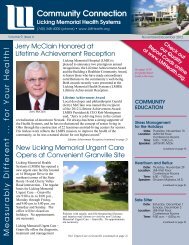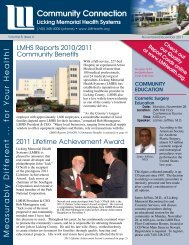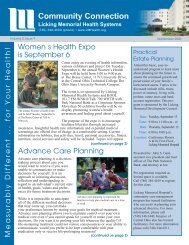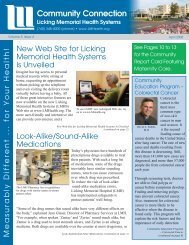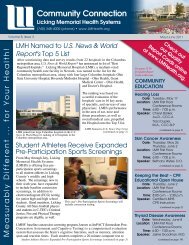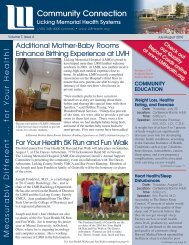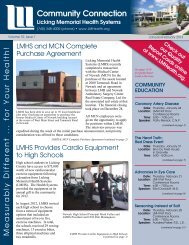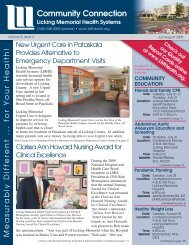March - Licking Memorial Health Systems
March - Licking Memorial Health Systems
March - Licking Memorial Health Systems
- No tags were found...
Create successful ePaper yourself
Turn your PDF publications into a flip-book with our unique Google optimized e-Paper software.
The First Baby of 2006 (continued from page 4)just three days short of her January 4 due date.Like most new parents, Karen and Rusty checked Kaciover thoroughly, including an inspection of fingers andtoes. “They’re all there,” Rusty said. “She’s just about asperfect as you can get.”Kaci is the first child for 20-year-old Karen, who is arestaurant server, and 25-year-old Rusty, who is a cookat the same restaurant. To prepare for the baby, thecouple read all sorts of parenting magazines. However,instead of a parenting magazine, there was a currentcopy of Motor Trend lying on the Hospital bedsidetray. “Somebody has to teach Kaci how to drive!”Rusty exclaimed.<strong>Licking</strong> <strong>Memorial</strong> <strong>Health</strong> <strong>Systems</strong> helped the youngcouple celebrate their daughter’s birth by presenting themwith a $100 gift certificate.As the magic of her daughter’s arrival began to sink in,Karen mused, “I never thought when we watched theTimes Square ball drop that 24 hours later we’d have ababy. That’s kind of neat.” Rusty nodded in agreement.“Every year, the whole world gets to celebrate yourbirthday,” he said quietly to Kaci as she slept inKaren’s arms.Compassionate 7-Year-OldCheers Other ChildrenFor the third consecutive year, 7-year-old Trent White ofHeath, played Santa Claus to some children in <strong>Licking</strong>County who might be less fortunate. As in the previousyears, Trent collected stuffed toys – 106 this time – todonate to children who were visiting <strong>Licking</strong> <strong>Memorial</strong>Hospital’s (LMH) EmergencyDepartment over the holidays.Trent keeps a snapshot in hismemory of the moment thatprovided inspiration for hisproject. He was riding in a caron West Main Street in Newarkwith his mother, Vicki, on aDecember day when he spotteda child walking next to theroadway in front of the Hospital,clutching a teddy bear. AlthoughTrent had never been in ahospital himself, he realized thatchildren who were hospitalizedaround Christmas could face anadditional problem that wasn’tmedical. “Kids on ChristmasDay probably didn’t have apresent since Santa comes totheir house, and they’re here atthe Hospital,” Trent reasoned.Since his first donation in 2003, Trent’s method ofaccumulating toys has evolved. Whereas he purchasedmost of the 52 toys that he donated that first year, henow receives many contributions. After hearing ofTrent’s project, one friend donated an entire collectionof Beanie Babies.Seven-year-old Trent White was greeted by <strong>Licking</strong> <strong>Memorial</strong><strong>Health</strong> <strong>Systems</strong> Executive Vice President Rob Montagnese ashe visited the Hospital to donate 106 stuffed toys.The Garfield Elementary second grader has also receivedrecognition from his friends and relatives. “The kids atschool say, ‘Oh, so you donated the toys?’ Then they askme questions,” he related. “People are giving me toys togive away because they like for the kids to be happy.”Trent has plans to continueexpanding his toy mission. In2006, he expects to makeperiodic donations to LMH inaddition to one at Christmas.For his continued support ofLMH, Trent was invited toparticipate in the June 2005Critical Care Pavilion groundbreaking,representing LMHdonors and the future.Page 5
Mall Walking Is Enjoyable ExerciseAn all-season indoor walkingtrack is sitting right in the heartof <strong>Licking</strong> County with nomembership fees and plenty offree parking. <strong>Licking</strong> <strong>Memorial</strong><strong>Health</strong> <strong>Systems</strong> (LMHS) andIndian Mound Mall have joinedforces to offer the LMHS MallWalker Program to encourageindividuals of all ages to exercisein a safe, comfortable environmentat their own pace. Theprogram is open to anyone whowalks for fitness and fun. Themall always welcomes walkersduring normal mall hours,however, the recommended mallwalker hours are from 8:30 to 10:00 a.m. because thereare no shoppers at that time.Whatever your age, walking can benefit you byimproving your overall health and quality of life.Walking is considered the safest and most natural wayto improve health and fitness. Some of the benefitsof walking are:A healthier heart. Walking is an excellent form ofaerobic exercise that increases your heart health bymaking your heart stronger.Weight loss. Brisk walking helps to burn fat.Reduced Stress. Walking can help you to better handlestresses in your life and increase your overall sense ofwell-being.Increased energy. Exercise is an energy booster.Walking increases the strength of your heart, decreasesbody fat, increases self-esteem and well-being, andrelieves tension.Mall walking makes good sense. The mall gives youbuilt-in security, a climate-controlled environment anda level surface for walking. Total mileage around theinside perimeter of Indian Mound Mall is three-quartersof a mile.Jimmy and Connie Wright walk three to four laps around IndianMound Mall every day as part of the Mall Walker program.Indian Mound Mall GeneralManager Bruce Goldsberry ispleased that the mall is able toopen its doors for such a worthwhileprogram. “Indian MoundMall welcomes the mall walkersto promote improved health andfitness. Some who utilize ourfacility may be recovering fromstroke or heart problems, andbecause we have a controlledenvironment protected from theelements, these individuals canexperience a daily walk tofacilitate their recovery withoutinterruption, regardless of theweather or season,” heexplained. Bruce added that the mall’s merchants lookforward to seeing the walkers. “Merchants enjoy theearly morning discussions with the regulars, as wellas the opportunity to promote their store to this groupof individuals.”Anyone, at any age, in almost any physical condition, canwalk because it’s safe and virtually injury-free; however,you should check with your doctor before beginning anywalking program, especially if you have a heart problem,have had severe bone or joint problems, or if you are amale over 45 or a female over 50 who is not accustomedto exercise.To join the free LMHS Mall Walker Program, completea registration card at the Indian Mound Mall office. Youmust be 18 years of age or older to participate. Youwill receive a free T-shirt and pedometer with yourregistration packet. Your membership includes monthlyscreening sessions. Walkers record their mall laps ona log sheet for personal information and to track howmany miles are walked.On the second Wednesday of each month from 8:30 to10:00 a.m., participants in the LMHS Mall WalkerProgram are invited to take part in free blood pressure orblood glucose health screenings at the mall entrance tothe food court. Cholesterol screenings are alsoavailable at certain times for $20.LMHS Celebrates National Doctors Day<strong>Licking</strong> <strong>Memorial</strong> <strong>Health</strong> <strong>Systems</strong> (LMHS) will payspecial tribute to our physicians on National DoctorsDay. In 1990, President George Bush signed a resolutiondeclaring <strong>March</strong> 30 as National Doctors Day. Thepurpose of the day is to set aside a time of recognitionfor those dedicated physicians who care for us and ourloved ones.LMHS will celebrate by serving the Active Medical Staffa continental breakfast and filet mignon luncheon, andby posting full-page newspaper advertisements toacknowledge their service to the <strong>Health</strong> <strong>Systems</strong> andthe community.Kathy Bradley, Director of Medical Staff Services at<strong>Licking</strong> <strong>Memorial</strong> Hospital, pointed out that the Hospitalis proud of the high quality care the physicians provideeach and every day of the year, and is glad for theopportunity to shine a well-deserved spotlight on them.“The doctors are very appreciative of the goodwill shownby the Hospital for this day of recognition,” she said. “Tothe Hospital, it is a time for us to show that we appreciateso much their commitment and dedication to improvingthe health of the community.”The LMHS Medical Staff consists of 135 active membersand 36 consulting physicians.Page 6
Development Spotlight: Nathan VorisNathan VorisLate last year, <strong>Licking</strong> <strong>Memorial</strong>Hospital (LMH) Development Councilmember Nathan Voris accepted aninvitation to join the Council. “TheHospital provides vital services to ourcommunity. I am excited about theopportunity to contribute to its success,”he said.Nathan serves on the FundraisingCommittee of the Council and is a member of theNewark City School Board. He has a Bachelor of Sciencedegree in Education from The Ohio State Universityin Columbus, Ohio, and is a graduate of NewarkHigh School.“Strong education and health care systems are two vitalcomponents of a thriving community,” Nathan said. “Asa member of the LMH Development Council and theNewark City School Board, I am able to provide inputto shape both of these important systems.”Nathan is employed as director of Institutional ClientServices of TIAA-CREF in Dublin, Ohio, and holds thecredentials of CRC – Certified Retirement Counselor.His hobbies include backpacking and golf. He and hiswife, Rebecca, reside in Newark.DonorsCapital ImprovementTWIGS 4TWIGS 6TWIGS 8TWIGS 14TWIGS 22TWIGS Executive BoardCorporationsCapital Wholesale DrugCompanyHonoraryLindsay Freytag honoringKathy BradleyRetiree Spotlight: Clarissa Ann HowardClarissa AnnHowardAlthough Clarissa “Ann” Howard retiredfrom <strong>Licking</strong> <strong>Memorial</strong> Hospital (LMH)in 1995, she remains an active supporterof the organization and serves as itshistorian. Most notably, Ann coauthored“Celebrating Our Past,Anticipating Our Future – the Historyof <strong>Licking</strong> <strong>Memorial</strong> Hospital,” a bookprinted in 1997 to commemorate the100-year anniversary of <strong>Licking</strong><strong>Memorial</strong> Hospital. She also served on the committeefor the year-long celebration.Ann was a staff nurse in the Newark Hospital surgerydepartment from 1950 to 1953. After completing herdegree, she returned in 1956 as a supervisor. From 1968to 1983, Ann was LMH Vice President of Nursing; from1983 until retiring in 1995, she was Vice President ofAdministrative Services. Ann currently serves on theCommunity Relations Committee of the LMHDevelopment Council and assists with the Council’sannual Golf Gala. She was one of the first people to jointhe Schaffner Society. Ann earned the President’s Awardin 1990 and the Hospital’s Lifetime Achievement Awardin 1997.The Schaffner Society was created in memory of the firstchairman of the <strong>Licking</strong> County Hospital Commission,William “Bill” Schaffner, who dedicated his life toCommunity CornerstoneMr. and Mrs. Gary BakerMr. and Mrs. Frank BentzMr. and Mrs. Jim CooperFirst Federal SavingsMr. and Mrs. Dave FroelichHouston Plumbing &Heating Inc.James J. IsenbergMr. and Mrs. Robert KentMr. and Mrs. David KlauderMr. and Mrs. George ManningMr. and Mrs. Roger McClainMr. Stephen R. PapanekMr. and Mrs. Orville VarassoMr. and Mrs. Robert WadeMrs. Verna Zeleinassuring the availability of quality health care servicesto our community. Given at <strong>Licking</strong> <strong>Memorial</strong> <strong>Health</strong><strong>Systems</strong> (LMHS) President Bill Andrews’ discretion, thePresident’s Award honors employees for exceptional,extraordinary service. The Lifetime Achievement Awardis presented each year to a citizen in our community whohas given volunteer service for the overall betterment ofthe community and who has helped to fulfill the missionof LMHS by helping to improve the health of thecommunity. This special recognition was created tohonor those whose vision, inspiration and leadershiphave touched and enriched many lives.While at LMH, Ann helped organize and open the Schoolof Nursing for Central Ohio Technical College (COTC)and also opened the coronary care and Maru (nowShepherd Hill) units.In addition to her involvement with <strong>Licking</strong> <strong>Memorial</strong>,Ann is a member of Newark-Heath Rotary – where sheis a Paul Harris Fellow, Soroptimist, Daughters of theAmerican Revolution – Hetuck Chapter, Coteria, MondayTalks, Granville Music Club and Sigma Theta Tau –International Nursing Honorary. She is a member of theFirst Presbyterian Church in Newark and is an ordainedelder and deacon. Ann volunteers at The Works in thecollection area and the Midland Theatre, both located indowntown Newark. She was honored in 1999 as aWoman of Achievement of <strong>Licking</strong> County and nowRetiree Spotlight: Clarissa Ann Howard (continued on page 12)Page 7
Community Report Card<strong>Licking</strong> <strong>Memorial</strong> <strong>Health</strong> <strong>Systems</strong>(740) 348-4000 (phone) • www.LM<strong>Health</strong>.orgChronic Heart Failure (CHF) ... a community report on patient care quality.HEALTH TIPSYou can take steps to lower your risk for chronic heart failure. Do the following for a heart-healthy lifestyle:• Lose excess weight. Consult your primary care physician for advice.• Don’t smoke.• Eat a low-sodium diet.• Limit your intake of fats and cholesterol.• Watch your blood pressure.• Exercise regularly.Patient Feature: Joe HeistJoe Heist went to see his primary care physician for anagging cough and congestion. His physician ordereda chest X-ray to view his lungs, suspecting that Joehad pneumonia. The X-ray revealed that Joe had anenlarged heart.“I had a medical history of moderately high bloodpressure, about 140/90. This stretched all of my tissuesand caused my heart to have to work harder to supplyoxygen and caused my overall muscle strength todecline,” said Joe. Upon the discovery of Joe’s enlargedheart, he was referred to a pulmonologist. “It was thepulmonologist who discovered the heart failure. He toldme that the angle that I was lying on the exam tableallowed him to see that my jugular vein pulsed when hepushed on my stomach. The pulsing of the jugular meantthat there was blood backed up in my heart and that I hadchronic heart failure,” stated Joe. He was then referred toBryce Morrice, M.D., Director of Cardiology for <strong>Licking</strong><strong>Memorial</strong> Hospital (LMH). Through further testing, Dr.Morrice informed Joe that his left ventricle of his heartwas working at only 35 percent capacity. “He put me onhypertension medication to relieve some of the stress onmy heart and blood vessels,” Joe continued. Joe was alsoadvised to take a beta-blocker medication to reduce hisheart rate. “Basically my heart would have worn itselfout trying to pump blood throughout my body. It wasworking so hard and fast, due to the decreased capacity,that it was wearing itself out,” said Joe.Joe was first diagnosed with chronic heart failure morethan four years ago. Dr. Morrice and the CardiologyDepartment of LMH monitor him regularly. “I amdelighted at what the Hospital and the CardiologyDepartment have done for me. I received top-notch carethat I probably wouldn’t have received elsewhere,”said Joe.Thanks to the care Joe Heist received at <strong>Licking</strong> <strong>Memorial</strong>Hospital, he is still able to take care of the animals on hisfarm in Alexandria, Ohio.Today, Joe remains active, working on his cattle farm inAlexandria, Ohio. “I can’t bale a wagon of straw, run arace or ice skate anymore – but I am still able to cut awagon of wood with a hydraulic splitter and get sixbales of straw ready to feed my cattle every day,”Joe said.Joe and his wife, Jane, have lived on their farm since1968. “I am a farmer by hobby, I worked as an engineeras my occupation,” stated Joe. He retired from engineeringat the Newark Air Force Base in 1994. He has aBachelor of Arts in physics from Thomas More Collegein Crestview, Kentucky and a Master’s degree inengineering from George Washington University inWashington, D.C. Joe and Jane have five children –one son and four daughters, and seven grandchildren.Page 8
Chronic Heart Failure: How Do We Compare?At <strong>Licking</strong> <strong>Memorial</strong> Hospital, we take pride in the care we provide. To monitor the quality of that care, we trackspecific quality measures and compare them to benchmark measures. Then, we publish them so you can draw yourown conclusions regarding your health care choices.1This indicator measures the average number of days chronic heart failure (CHF) patients are hospitalized during each inpatientstay. Length of stay is one indicator a hospital should consider in determining if it is using resources for inpatient care appropriately.CHF average length of stay should be close to the benchmark.LMH 2003 LMH 2004 LMH 1/05-10/05 Benchmark (1)Average length of stay for 3.4 Days 3.2 Days 3.1 Days 5.4 DaysCHF patients2Inpatient mortality measures the percentage of inpatient deaths among all CHF patients admitted to<strong>Licking</strong> <strong>Memorial</strong> Hospital.LMH 2003 LMH 2004 LMH 1/05-10/05 Benchmark (1)CHF inpatient mortality 2.9% 0.9% 1.2% 3.7%3The left ventricle is the chamber of the heart that pumps blood out of the heart and into the body. Measuring left ventricularfunction (LVF) helps determine how well a CHF patient’s left ventricle is working.LMH 2003 LMH 2004 LMH 1/05-10/05 Benchmark (1)LVF assessment 93% 95% 97% 92%4Medications beneficial to many CHF patients include angiotensin-converting enzyme (ACE) inhibitors, beta blockers, andangiotensin-receptor blockers (ARBs). ACE inhibitors and ARBs have been shown to lower mortality and improve functionalcapacity and quality of life. Beta blockers can reverse or prevent some of the health effects associated with heart failure.Patients treated with beta blockers may see significant improvement in heart function after three months. The <strong>Licking</strong><strong>Memorial</strong> <strong>Health</strong> Professionals (LMHP) physician offices also monitor quality data for CHF patients seen in each office.LMH 2003 LMH 2004 LMH 1/05-10/05 BenchmarkCHF patients on ACE 85% 91% 99% 86% (1)or ARB at dischargeCHF patients on Beta at discharge 77% 96% 99% 90% (2)LMHP 3Q 2003 LMHP 3Q 2004 LMHP 3Q 2005 LMHP GoalLMHP office patients on ACE or ARB 98% 94% 96% greater than 90%5It is vital that CHF patients be involved in their own care to reduce health complications and improve quality of life. Theyneed to monitor their weight, limit their salt intake, and take their medications regularly. <strong>Health</strong> care providers need to givethorough discharge instructions to help these patients effectively manage their condition.LMH 2003 LMH 2004 LMH 1/05-10/05 Benchmark (1)All discharge instructions completed 85% 85% 91% 62%Data Footnotes:(1) Comparative data from the MIDAS Clinical Comparative Database for second quarter 2005.(2) Benchmark indicates LMH goalPage 9
Living With Heart Failure (continued from page 10)• Don’t give up if you smoke a cigarette. Just resolve notto do it again.• Remind yourself that you’re likely to feel better if youstop smoking.• Tell family members and friends that you need to quitsmoking and need their support. If your husband, wife,son or daughter smokes, ask them to quit with you.Action PlanHeart failure requires you and your caregivers to payclose attention to any changes in symptoms. If younotice something new, or a sudden worsening of a currentsymptom, notify the doctor immediately. Here’s what towatch for:• Sudden weight gain — 3 or more pounds in one day,5 or more pounds in one week, or whatever amount youwere told to report. That’s why it’s so important forpeople with heart failure to weigh themselves every day– preferably every morning, before breakfast and afterurinating, with the same type of clothes on, withoutshoes, on the same scale and in the same spot.• Shortness of breath while at rest or with changes inactivity level.• Increased swelling of the lower limbs (legs or ankles).• Swelling or pain in the abdomen.• Trouble sleeping (awakening short of breath, usingmore pillows).• Frequent dry, hacking cough, especially at night.• Loss of appetite.• Increased fatigue or feeling tired all the time.Physician Spotlight: Elliot Davidoff, M.D., F.A.C.S.Elliot Davidoff,M.D., F.A.C.S.<strong>March</strong> is National Save Your Visionmonth. It is a good time of year toremember to make an appointment withyour ophthalmologist for a routinecheck-up to help prevent or detect eyehealth problems. In recognition of SaveYour Vision month, <strong>Licking</strong> <strong>Memorial</strong>Hospital (LMH) is proud to have ElliotDavidoff, M.D., F.A.C.S., as a long-timemember of the LMH Active MedicalStaff. He is one of three physicians who practice at theCenter For Sight, located in Newark. Dr. Davidoff hasbeen serving as an Ophthalmologist at LMH since April1977. While at LMH, Dr. Davidoff has served for severalyears on the LMH Executive Committee. He was ViceChief of Staff for the Medical Staff and served two termsas Chief of Medical Staff. “I wanted to choose a practiceopportunity in a nice community for my family. <strong>Licking</strong><strong>Memorial</strong> has provided me with the best equipment toallow me to care for my patients and is willing to upgradetechnology as it advances,” said Dr. Davidoff.Dr. Davidoff received his Medical Degree from the NewYork Medical College in New York, New York. He completedhis medical internship at the Lenox Hill Hospitalin New York, New York, and his ophthalmology residencyat Bronx-Lebanon Hospital Center of the AlbertEinstein College of Medicine in Bronx, New York.Dr. Davidoff received his Bachelor of Science degree inZoology from the University of Rhode Island inKingston, Rhode Island.“I spend a lot of my ‘free’ time in medical endeavors. Ispent many years in hospital leadership positions and inclinical research or teaching,” said Dr. Davidoff. He hasalso been able to travel and serve as visiting faculty inChina and Ethiopia through ORBIS International. As anonprofit organization, ORBIS exists to eliminate blindnessand restore sight. Working in partnership with localhealth professionals and members of the community,ORBIS seeks to improve the quality and availability ofeye care services where the need is greatest. Dr. Davidoffwas a member of the Granville Jaycees, served on theboard of LEADS and on the board and as president of theOhev Israel Temple in Newark. When not busy withwork, he can be seen bicycling around the county inwarm weather and skiing out west in the winter.Dr. Davidoff and his wife, Margie, reside in Granville,Ohio. Margie has recently retired from Center For Sight,where she was the practice administrator. Together theyhave two sons, Adam and Mike. Adam and his wife,Heather, reside in Granville. He is a teacher in FranklinCounty. They recently had their first baby, Eli. Mikeresides in Colorado, where he is a school social worker.He and his wife, Alice, recently had twins, Lilyand Noah.Dr. Davidoff has really enjoyed his practice in Newarkand serving <strong>Licking</strong> <strong>Memorial</strong>. “I continue to practicehere because I feel that I am a part of this community. Itseems that whenever I am out shopping someone willcome up and thank me for their care. It gives me a goodfeeling – that I have had a positive impact upon people’slives,” said Dr. Davidoff.Page 11
Ask-a Doc: Elliot Davidoff, M.D., F.A.C.S.Question: What is new the cataract treatment?Answer: Cataract surgery today is much more advancedthan back when I was in training. In 1976, our patientsspent nine days in the hospital and could not see forapproximately three months. Patients had to wear eithervery heavy, thick glasses or hard contact lens. Also, therate of complications was fairly high.With step-wise improvements, we can now operatethrough a small (less than 3 millimeters) incision,which is self-healing and does not require sutures. Wenow put intraocular lens implants in the eye. These canoften give patients better vision than they have ever had.The intraocular lens can now be folded and placedthrough the small incision. This surgery requires themost advanced cataract technology available at<strong>Licking</strong> <strong>Memorial</strong>.Recent technological advances in lens implants includelenses that correct nighttime aberrations, block blue light(which may reduce the risk of macular degeneration) andcorrect astigmatism. The latest advance is an implantwhich is multifocal. It allows patients to see at distanceand be able to read without glasses. This implant is notfor everyone, but for those who are candidates, it is great.Be sure to speak with your Ophthalmologist about whichprocedures would be best utilized for your eye health. Formore information about the procedures offered at <strong>Licking</strong><strong>Memorial</strong> Hospital, please call (740) 522-8555.Dr. Johnson Is New Inpatient Pediatrician at LMHShelsea L.Johnson, M.D.<strong>Licking</strong> <strong>Memorial</strong> <strong>Health</strong> <strong>Systems</strong> ispleased to announce the addition of anew inpatient pediatrician, ShelseaL. Johnson, M.D., to the <strong>Licking</strong><strong>Memorial</strong> Hospital Active Medical Staff.Dr. Johnson received her Bachelor ofArts degree in Biology from WittenbergUniversity in Springfield, Ohio. Shereceived her Medical Degree fromWright State University School ofMedicine in Dayton, Ohio. Dr. Johnson then completeda pediatric internship and pediatric residency, both at theChildren’s Medical Center at Wright State UniversitySchool of Medicine.Dr. Johnson is a member of the American Academyof Pediatrics.She and her husband, Christopher Madison, M.D., havefour children, 10-year-old Aaron, 4-year-old Ayanna,3-year-old Aquavee, and 2-year-old Agbeyenu.Retiree Spotlight: Clarissa Ann Howard (continued from page 7)serves on the Achievement Committee. She served onseveral local boards.The Newark High School graduate received a diploma ofNursing from Good Samaritan School of Nursing inZanesville, Ohio; a Bachelor of Science degree from theCollege of Nursing at The Ohio State University inColumbus, Ohio; and an Associate’s paralegal degreefrom the National Institute for Paralegal Arts andSciences in Boca Raton, Florida. Ann likes to play golfand travel with her friends.were real honors,” she said. Ann said she was fortunateto have worked with many outstanding staff and cabinetmembers over the years. “The staff were all wonderful,”Ann said. “It’s been a great experience and a big part ofmy life.”The move of Newark Hospital to <strong>Licking</strong> <strong>Memorial</strong>Hospital from Everett Avenue to its current West MainStreet location in July 1966 is among Ann’s favoritememories. The evening she was surprised with theLifetime Achievement Award and the night she receivedthe President’s Award are also fond memories. “These allPage 12
Volunteer Spotlight: Silver Club of Zerger HallThe Silver Club of Zerger Hall isa group of seniors who joinedtogether to provide communityservice to <strong>Licking</strong> County. “Thegroup started at an old church on5th Street many years ago. It hassince moved a couple times and isnow located at Zerger Hall,” saidBetty Meyers, Silver Club liaisonto <strong>Licking</strong> <strong>Memorial</strong> Hospital.The Silver Club is a group of morethan 30 full-time members whorange in age from 60 to 90 years. The majority of theclub is women, but men are involved and alwayswelcomed to join. Silver Club meets every Thursday at9:00 a.m. at Zerger Hall and does many services andcrafts for the community.For <strong>Licking</strong> <strong>Memorial</strong> Hospital, they make tray favors,cards and crocheted lap throws. For local schools, theycollect caps, gloves, undergarments, sweat pants andshirts and other warm clothing to donate to local schoolsto help students who are in need. They also take up a collectionwithin the group and make a monetary donation<strong>Licking</strong> <strong>Memorial</strong> <strong>Health</strong> <strong>Systems</strong> ispleased to announce that KarenNewman, R.N., has been named to theposition of Patient Care Manager forCritical Care at <strong>Licking</strong> <strong>Memorial</strong>Hospital (LMH).Karen graduated from Westland HighSchool in Columbus, Ohio, and earnedher Bachelor of Science in Nursingdegree from Capital University. She brings an extensivemedical background to LMH that includes nursingsupervising and being a pediatric intensive careunit nurse.to the local food pantry. “Thisgroup is so special – they give somuch of themselves,” said Betty.“We appreciate so much thedonations from the Silver Club.The tray favors and lap blanketscan make such a difference forour patients,” said Carol Barnes,Director of Volunteers, TWIGSand Events for <strong>Licking</strong> <strong>Memorial</strong>Hospital. Betty serves as theliaison for the Silver Club and<strong>Licking</strong> <strong>Memorial</strong>. She brings the donations to theHospital and records the hours of service for theVolunteer Department.If you are interested in becoming a member of the SilverClub, attend a meeting on any Thursday at 9:00 a.m. inZerger Hall. The only requirement is that you must be atleast 60 years of age. “We are always so pleased to seenew members,” said Betty.LMH Has New Patient Care Manager for Critical CareKaren Newman,R.N.The gifts from the Silver Club of Zerger Hall benefit<strong>Licking</strong> <strong>Memorial</strong> Hospital and <strong>Licking</strong> County.Administrative Spotlight: Chris KeckDirector of Contract ManagementChris Keck proudly marks 20 yearswith <strong>Licking</strong> <strong>Memorial</strong> <strong>Health</strong> <strong>Systems</strong>(LMHS) this spring. “I started mycareer at LMHS in June 1986 as a staffaccountant just shortly after graduatingfrom college,” he said. “I have remainedat LMHS for a variety of reasons; theChris Keckmost compelling is that I enjoy being amember of an organization whose Board andAdministration are committed not only to serving theShe now resides in Granville along with her husband,David, and their six children: 12-year-old twins Jordynand Ryan, 10-year-old Kaitlin, 8-year-old Kayla,6-year-old Noah and 5-year-old Chase.community but also to striving to be the best in what itdoes – delivering safe patient care.”Chris’ current primary focus is the construction projectfor the new Critical Care Pavilion at <strong>Licking</strong> <strong>Memorial</strong>Hospital (LMH). “Our overall goal is to provide thecommunity with a state-of-the-art Emergency Departmentand Surgery Department,” he said, noting that the projectinvolves approximately 83,000 square feet of newconstruction and 7,000 square feet of renovation. “Afterhaving spent many months working with the variousAdministrative Spotlight: Chris Keck (continued on page 14)Page 13
Community Education Program: Behavioral Treatments for Urinary Incontinence (continued from front)Symptoms of stress incontinence involve the involuntaryrelease of urine, especially when coughing, sneezing orlaughing. It is the most common type of urinaryincontinence in women. It usually results in a smallto moderate amount of urine leaked.Symptoms of urge incontinence include the need tourinate frequently and a sudden, urgent and uncontrollableneed to urinate. It can result in a moderate to largeamount of urine leaked, although it often occurs when thebladder contains only a small amount of urine.It is common for a woman to have mixed incontinence,usually a combination of stress and urge incontinence.What Increases Your RiskSometimes several factors combine to cause urinaryincontinence. For example, a woman may have had multiplechildbirths, be older, and have a severe coughbecause of chronic bronchitis or smoking, all of whichmight contribute to her incontinence problem.Physical conditions that make urinary incontinence morelikely include:• Pregnancy and vaginal delivery• Having had a hysterectomy• Obesity or being overweight• Older age• Bladder stones• Lack of estrogen after menopause• Structural abnormalities of the urinary tract• Blockage of the bladder• Chronic bladder infectionsIf you have any questions or believe that you are experiencingurinary incontinence, please be sure to speak withyour primary care physician to see what steps need to betaken to address your concerns.Speaker Kathleen Yeagley has worked as the researchand training director for an organization which marketsa new behavioral treatment for UI. She now serves asthe Manager of Education for <strong>Licking</strong> <strong>Memorial</strong><strong>Health</strong> <strong>Systems</strong>.Registration for this education session is required.To register or for more information, please call(740) 348-1434.FAQs About Colorectal Cancer (continued from page 2)ways to prevent colorectal cancer. Research is under wayto determine whether dietary changes may decrease therisk for colorectal cancer. Currently, there is no consensuson the role of diet in preventing colorectal cancer.However, medical experts recommend a diet low inanimal fats and high in vegetables, fruits and wholegrain products to reduce the risk of other chronicdiseases, such as coronary artery disease and diabetes. Itmay also reduce the risk of colorectal cancer. In additionto studying dietary changes, researchers are examiningthe role of certain medications and supplements, includingaspirin, calcium, vitamin D and selenium, in preventingcolorectal cancer. However, the most effective way toreduce your risk of colorectal cancer is by having colorectalcancer screening tests beginning at age 50.Q: Who should be tested for colorectal cancer?A: All men and women aged 50 years or older should betested routinely for colorectal cancer. Others who are atincreased risk should speak to their doctors about earlieror more frequent testing. Those at increased risk arepeople with:• A family history of colorectal cancer orcolorectal polyps;• Certain diseases of the intestines, includinginflammatory bowel disease (ulcerative colitis orCrohn’s disease); and• Genetic syndromes such as familial adenomatouspolyposis (FAP) or hereditary nonpolyposis coloncancer (HNPCC). (Just 5 percent of colorectal cancersare linked to these genetic syndromes.)Q: Why should I get screened?A: Screening saves lives. Having regular screening testsbeginning at age 50 could save your life. Colorectal cancersalmost always develop from precancerous polyps(abnormal growths) in the colon or rectum. Screeningtests can find polyps, so they can be removed before theyturn into cancer. Screening tests also can find colorectalcancer early, when treatment works best and the chancefor a full recovery is very high.Q: What are the symptoms of colorectal cancer?A: Colorectal cancer develops with few, if any,symptoms at first. However, if symptoms are present,they may include:• blood in or on the stool;• a change in bowel habits;• stools that are narrower than usual;• general, unexplained stomach discomfort;• frequent gas, pains, or indigestion;• unexplained weight loss; or• chronic fatigue.These symptoms can also be associated with other healthconditions. If you have any of these symptoms, discussthem with your doctor. Only your doctor, through testing,can determine why you’re having these symptoms.Page 15


